Our Parenting World’s Exclusive Interview Series: Meet Michael Cafe, Master Butcher of Ryan’s Grocery
We have seen Michael Cafe, Master Butcher of Ryan’s Grocery led an insightful butchering demonstration on a Shoulder Rack of Lamb during the media tasting. We are all impressed!
Michael has more than 30 years of experiences and as the Master Butcher, he has to make sure the meat sold at Ryan’s Grocery is of the freshest and highest-quality meat. Michael is very experienced in all aspects of professional butchery, manufacturing and meat grading, to ensuring safety requirements. He is very knowledgeable and able to make suitable and good recommendations to customers to keep them coming.
Our Parenting World (OPW) team is pleased to be able to interview Michael Cafe (MC) to find out more:
1. Please share with us more about your background and what made you decide to become a butcher?
MC: I have been exposed to the industry since the age of 13, when I started working part-time at a butcher shop. I have always been passionate about handling fresh produce and understanding it. Furthermore, I realized that there was a lot of knowledge required in becoming a good butcher and to run a well-managed butchery. So, I decided to pursue this as my career.
In a nutshell, being a butcher is more than just cutting meat. To optimally manage a butchery, one needs to know all aspects of each type of meat (beef, lamb, pork), the types of cuts, how to make the cuts and how to process and store the meat. Within the factory, butchers are the custodians of food handling, where we are the key to ensuring that high standards of hygiene are maintained. A well-trained butcher can help minimize cost for the business as we ensure that food wastage through cutting and storage is minimised. Outside of the factory, butchers are the chefs’ key partners as we help recommend optimal cuts for their dish. The quality of our work has a direct impact on the outcome of the dish.
2. When did you start training to become a butcher and how can one become a butcher?
MC: I started my career working part-time at a butcher shop at the age of 13. To become a certified butcher, one would have to sign up for a Certificate in Butchery course that provides training in identifying, fabricating and utilizing cuts of meat. Beyond the certification, I will recommend that you sign up for butcher training programs such as Small Goods Production Training, Carcass Meat Grading and Assessing and Meat Retailing and Merchandising. These programs will give you the knowledge needed to excel as a butcher.
If you go to Sydney, you can join Granville College, the largest training college in Sydney which provides on-the-job training for trade industries. I personally taught butchery there for 4 years.
In Singapore, one may reach out to “At-Sunrice Globalchef Academy” to take up a butchery course.
3. What are some of the challenges that you faced in your career?
MC: Many people have the misconception that all we do is to cut meat and they do not understand the value of a trained butcher. To excel in this trade, a lot more knowledge and skill is required. Education is key for continued professional growth, to constantly excel at what we do. I personally participated in training programs such as Small Goods Production Training as well as Statement and Carcass Meat Grading and Assessing to equip myself with the skills needed as a butcher.
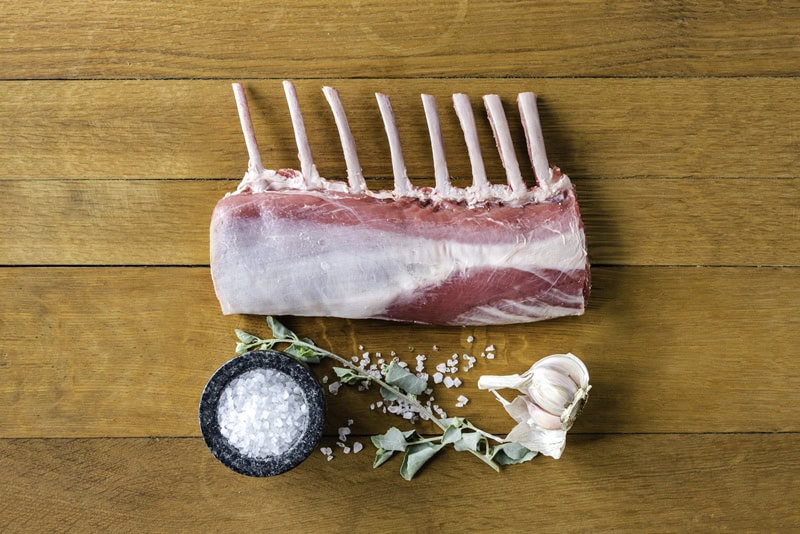
4. What do you like most about being a butcher?
MC: I love the simple conversations I have with each customer. I get to learn about their understanding of meat and their requirements to be able to give my best recommendations.
5. Can you tell us more about the meat at Ryan’s Grocery? Where does it come from?
MC: All our organic beef, pork, lamb and chicken are from Australia; except for Organic Prairie Pork, which is from the United States.
The process begins with sourcing trips by our Founder, Wendy Foo. Wendy’s commitment to offer the best quality, organic, allergen-free, gluten-free and other specialty food products to the local community, sees her travelling to Australia every two to three months. She personally visits producers and farmers, taking time to understand their production and farming processes and ensuring their practices are aligned with Ryan’s Grocery’s support for ethical farming and humane animal treatment. We order our cattle whole, allowing us to pick the best and check on the animals prior to sending them to the abattoir. As our meats come in carcasses, we process them in our factory, where the utmost care for hygiene is enforced, before sending the meat out to retail.
6. What’s the difference between organic and non-organic meat? Is it true that organic meat is better and what are the advantages of having organically raised meat?
MC: Organic food often has more beneficial nutrients than their conventionally-grown counterparts. People with allergies to certain food, chemicals, or preservatives often find their symptoms lessen or go away when they eat only organic food.
When it comes to livestock, strict rearing guidelines are enforced to ensure high standards of animal welfare and product integrity. Organic livestock are raised without the use of antibiotics and growth hormone stimulants, and this makes it a healthier choice. There is also a notable difference in both the taste and nutritional value of organic meats due to the ethical farming practices and availability of open grazing pastures where the animals are able to roam and live naturally. As such, organic meats often have a fresher and more authentic taste. Studies have also shown that organic meats are higher in antioxidants and omega 3, resulting in a better taste experience on the palate.
Take for example Organic Prairie Pork, available at Ryan’s Grocery. Their meat was third-party organic certified long before federal organic standards were even established, and they have played a vital role in shaping federal organic meat certification standards. The farming practices adhere to the strictest organic production and humane treatment standards. Antibiotics, toxic pesticides or synthetic hormones are never used, and the animals receive only vegetarian, organic and non-genetically modified feed. Livestock on their farms are pastureraised, bedded on thick straw, and given plenty of room to roam and enjoy fresh air and sunshine. Hogs raised on pasture have 300% more vitamin E and 74% more selenium (a vital antioxidant) in their milk than those raised in confinement.
Moreover, organic pork has more omega-3 fatty acids, which have shown to have beneficial effects to coronary health as well as aid in the treatment of depression.
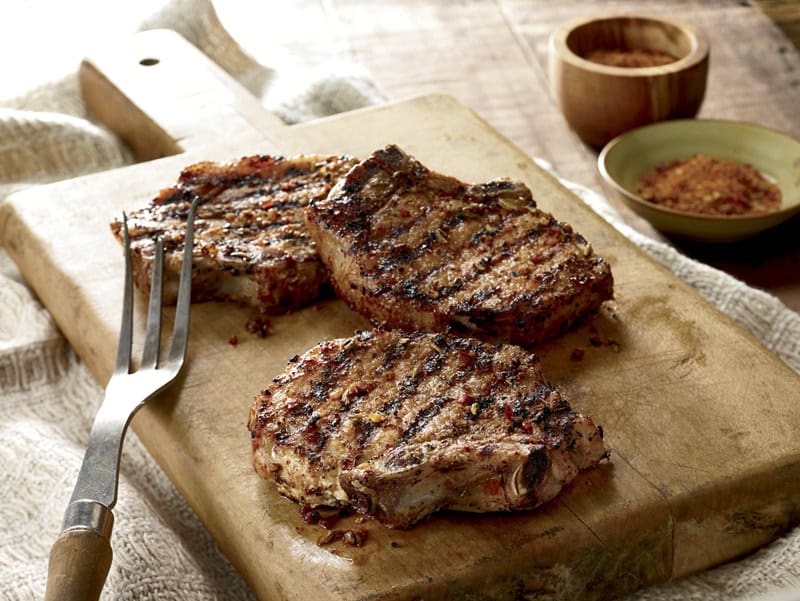
7. What should consumers look for when buying meat?
MC: When choosing meat for freshness, visual appeal is a big thing. When a piece of meat looks good, it should taste good as long as you get it home and put it straight into the fridge.
When determining the freshness of meat, the package date is always a good guideline. However, there are also a lot of factors involved. For example, it will depend if the meat has been transported at the right temperature. If it has not, it will have a shorter shelf life. A simple rule to follow: if it doesn’t smell good, throw it out. When in doubt, throw it out.
8. What’s your favourite cut of meat?
MC: One of my all-time favorite beef cut is Oyster Blade. It is super economical, great value for money and it has a really soft texture and a good flavor as this comes from the shoulder which is good for a variety of dishes especially BBQ and grilling.
9. Do you cook? What are some of your favourite cuisines?
MC: Yes, I do cook often. I like to simply pan-fry or grill my meat. When not pan-frying or grilling, I love making beef stew as well as roasted pork. Since I came to Singapore, my favourite food here will be Char Siew.
10. Lastly, do you have anything that you would like to add on and share with our readers about Ryan’s Grocery?
MC: Committed to providing the best quality products to the local community, Ryan’s Grocery is constantly in search for new additions to their ever-growing range of organic, free-range, and allergen-free meats. In addition, Ryan’s Grocery also carries a wide array of products that are complementary to their outstanding meat offering. From organic fruits and vegetables, to a diverse variety of over a 1,000 gluten-free products, in fact 99% of the store is dedicated to products free of gluten and wheat allergens. Ryan’s Grocery is a butcher, a grocer and a purveyor of specialised foods catering to a variety of dietary intolerances i.e. gluten and dairyfree, vegetarian and vegan and those seeking egg, nut and soy free foods and we are constantly adding to our list of offerings.
Thank you Michael Cafe for taking our interview!
About Ryan’s Grocery:
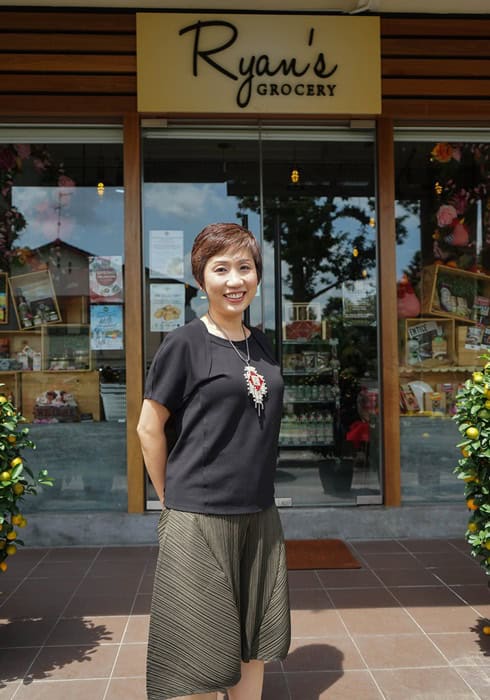
Ryan’s Grocery founder, Wendy.
Ryan’s Grocery was inspired by founders Sebastian and Wendy Chia’s son Ryan. After learning of their child’s intolerance to dairy products, gluten, nuts, soy, egg and yeast, they made numerous trips to Australia to personally source for organic meats and gluten-free produce directly from farms and farmer’s markets. It was here that they developed relationships with several small batch specialist producers in Western Australia and decided to open Ryan’s Grocery as a means of supporting a community of customers with intolerances.
Ryan’s Grocery’s full-service butchery directly sources and exclusively imports grass fed organic Blackwood Valley Beef from Western Australia. The butchery also carries organic pork from Organic Prairie, free-range Borrowdale pork and organic beef and lamb from Thomas Farms. Antibiotic-free, hormone-free, free range chickens are available while gluten-free, preservative-free, organic sausages are made in accordance with a home recipe. The Grocer is committed to supplying one of the largest range of gluten-free products from flours to pasta, biscuits, sauces and condiments.
For more information, go to www.ryansgrocery.com.

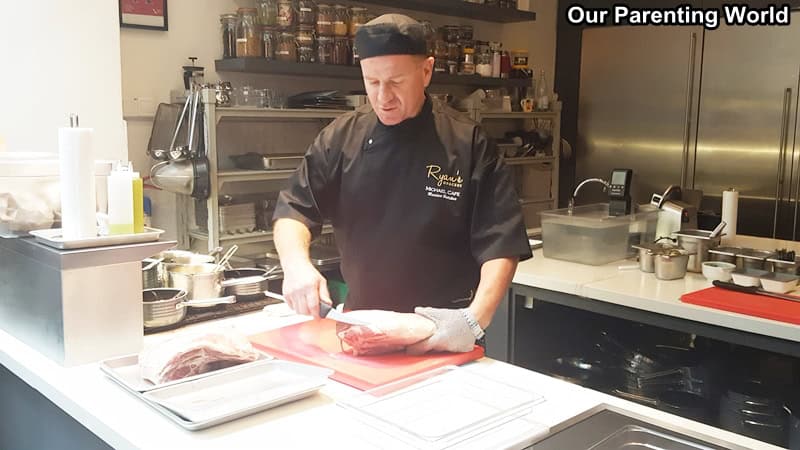
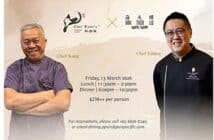


2 Comments
Pingback: Usher in the Year of the Dog with Ryan’s Grocery’s Healthy Feasting | Our Parenting World
Pingback: Shabu Shabu Your Way to Prosperity this Lunar New Year with Ryan’s Grocery